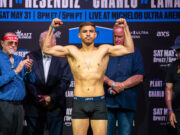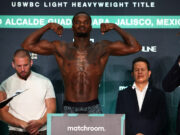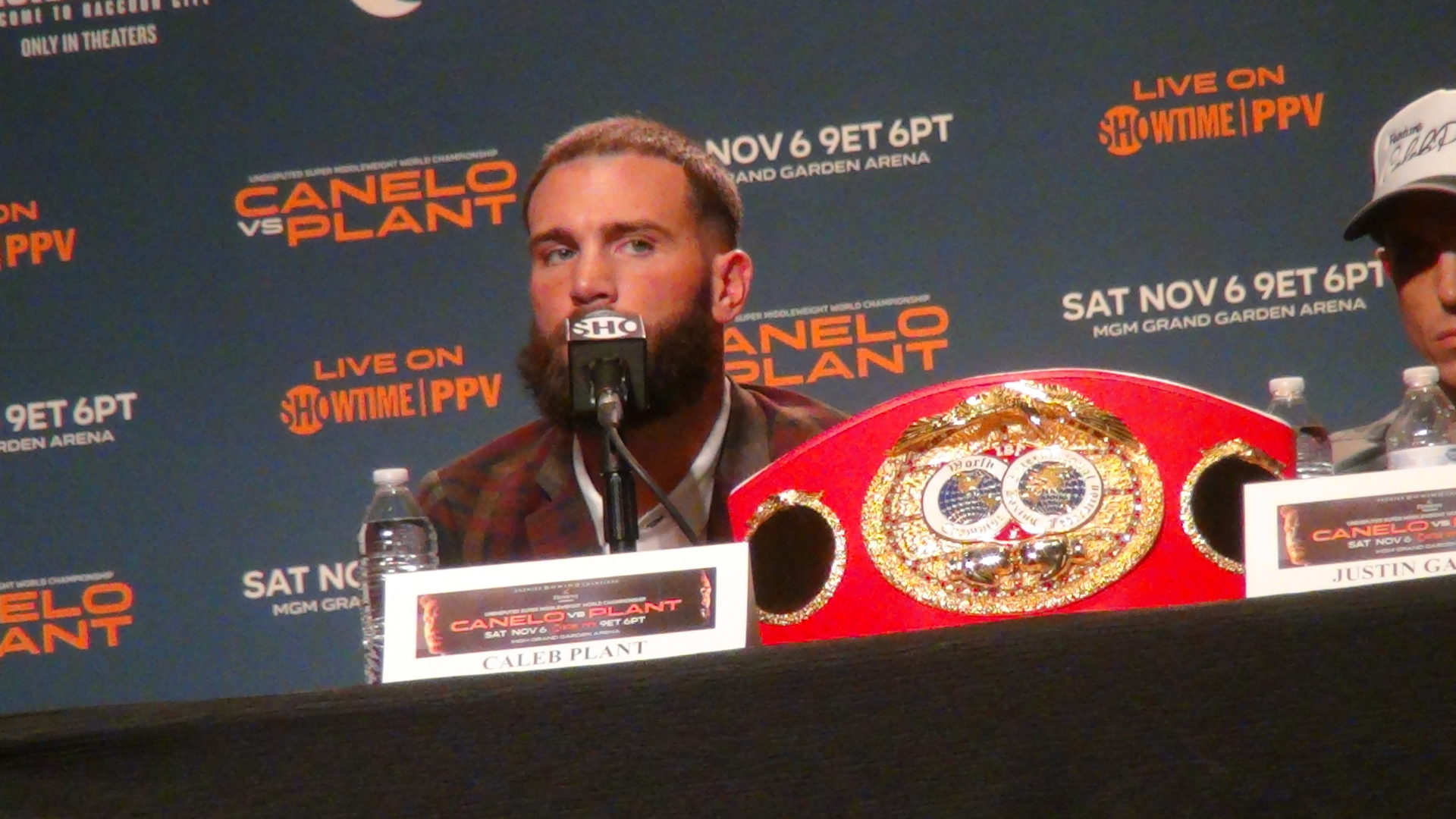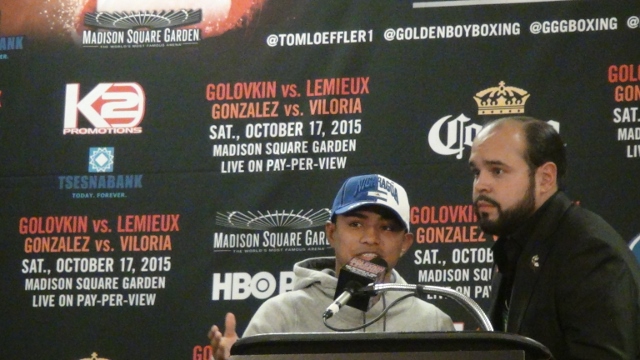By Bart Barry-
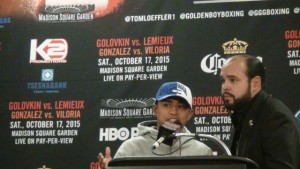
In Tokyo on Sept. 5, 2014, Roman Gonzalez became the second Nicaraguan prizefighter to become a three-division world champion, putting him deservedly beside his late mentor Alexis Arguello, and it brought more emotion than he appeared to expect. Gonzalez marked the achievement and defense of his other world titles with understated celebrations but not in Tokyo. His third championship won, his blue gloves folded on his raised brown forehead, Gonzalez wandered in circles sobbing.
By early 2014 Chocolatito’s postfight comportment had begun to manifest nothing quite so much as gratitude, perhaps life’s most universally attractive quality because it confidently expresses something akin to humility but better: However much I deserve, I’ve received slightly more, and I’m aware it didn’t have to be like that. Maybe Chocolatito’s gratitude began with his religious devotion – by now he wore “Dios Te Ama (God Loves You)” on the back of his every pair of trunks – or perhaps a simple, rational accounting led him to recognize he was given superior athleticism and a mentor like El Flaco Explosivo, both exceptional and exceptionally available, but his sense of atonement certainly came from his deep religiosity and began showing itself in the way he treated opponents immediately after bludgeoning them with a talent God gave him to hurt other men deeply and permanently.
If Chocolatito’s calculus did not figure how much more permanently he would hurt opponents at higher weightclasses, men whose thicker necks and larger bodies absorbed more concussive force while their brains did not, he intuited it and began to clean his opponents’ faces and look after their wellbeings more firmly in 2014, instructing the trainers of the men he felled where to apply icepacks and how to look after their charges. There was nothing unprofessionally merciful about what Chocolatito did while a fight was on, though; he realized combat with larger men brought disproportionately more peril, especially when they were hurt, and he finished them with his same quickness as before and increased ferocity. But he saw in the men’s sudden imbalance and brokenspiritedness how much dangerously further these larger men’s bodies and wills took them after their brains wanted no more. Too confident to doubt his power as he fought larger opponents Chocolatito kept a private tally of how harshly he must treat these larger men – the greater sums of fully leveraged, completely pronated, precisely placed punches he now delivered them.
Because his purity of technique went nowhere. Properly grown in his new 112-pound division, trim and light once more, Chocolatito began fights with uppercuts to the head as diversions from what hooks he planned for the body to sap what strength kept the hands highly protective till they dropped and others’ unconsciousnesses went irresistibly to his hooks and crosses. He didn’t mind missing in his new weightclass either – a return to indifference: So long as a punch was balanced properly and executed with intent it mattered little if it landed because it cost even less to stop it and cocked its successor anyway and that one’d land.
Gonzalez needed to throw every punch wickedly in his new division, a lesson processed in Chocolatito’s six-round February beating of Mexican Juan “El Loquito” Kantun in Chiapas and three-round April leathering of Filipino Juan Purisima in Japan, because his handlers knew he was a generational talent they didn’t intend to fiddle in a nostalgia quest for unification, belt-collecting or purse-aggrandizement: Chocolatito’s first title fight at flyweight was against the division’s best man, Japan’s Akira Yaegashi, for The Ring’s flyweight championship, in Tokyo.
Yaegashi was larger than Chocolatito and stronger and more physical and forced the Nicaraguan backwards with jabs in the first round. Chocolatito retreated and counterpunched but didn’t run, and guarded against Yaegashi’s invitational traps and lowered hands and ropesward stumbles. In round three Yaegashi opened a hook off his cross, 2-3, and Chocolatito’s 3 was shorter and corkscrewed the champion to the mat. Yaegashi rose undissuaded and less chastened and continued a spectacle whose violence befit its world-championship occasion. Five rounds of combat did little to soften the Japanese and Chocolatito met in round 9 a belligerence nearer Yaegashi’s very best than he faced till then. The desperation with which Yaegashi opened the ninth belied his resources and betrayed his hopelessness, and 39 prizefights and thousands more hours of sparring and their tens of thousands of lessons in completing patterns, all, told Chocolatito th’t Yaegashi was on his way out and there was nothing to be done now but throw punches to the head to raise the guard then throw punches to the body to lower the guard then throw punches to the head till either the referee’s forbearance or Yaegashi’s consciousness lost attrition’s race, and it was a tie when Yaegashi dropped from physical failure and concussion.
Chocolatito needed a signature win no more than Leo Tolstoy needed a signature story – such talents don’t define themselves like that – but he had one just the same against a larger man who made him make creative choices like ending combinations with a jab, youth-boxing style, and so in 2014 Gonzalez was the world’s best prizefighter even while the world argued about great fighters well past their primes and good fighters lollygagging through their primes. Chocolatito returned to Japan two months later for his first flyweight title defense and fourth match of 2014 and wrecked Filipino Rocky Fuentes in six rounds then brought his championship home to Managua and began 2015 by roughly disciplining Mexican journeyman Valentin Leon for 6 1/2 minutes.
After that, things serendipitous happened for Gonzalez and HBO and aficionados. Y’all know the rest of the Chocolatito story from here.
Bart Barry can be reached via Twitter @bartbarry



